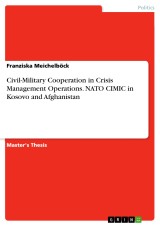Details

Civil-Military Cooperation in Crisis Management Operations. NATO CIMIC in Kosovo and Afghanistan
1. Auflage
|
CHF 16.00 |
|
| Verlag: | Grin Verlag |
| Format: | |
| Veröffentl.: | 15.06.2021 |
| ISBN/EAN: | 9783346420961 |
| Sprache: | englisch |
| Anzahl Seiten: | 36 |
Dieses eBook erhalten Sie ohne Kopierschutz.
Beschreibungen
Master's Thesis from the year 2019 in the subject Politics - Topic: International relations, grade: 65/B, Dublin City University (School of Law and Government), language: English, abstract: The following thesis will offer a comprehensive outlook at civil-military cooperation. The first two chapters look at civil-military cooperation in general and demonstrate ways to analyse the concept of civil-military cooperation with approaches of civil-military relations and inter-organizational relations. The third and fourth chapter will look at the institutional theory and its explanatory framework for analysing civil-military cooperation. The analysis of civil-military cooperation in the institutional framework will occur with the method of the policy cycle and looks at the NATO CIMIC Framework and its implementation in the cases of Afghanistan and Kosovo.
Since the end of the cold war, the number of conflicts and humanitarian crises increased and the efforts of the international community in crisis management occur in highly complex situations in which sole military or humanitarian efforts cannot provide a solution to the situation. Civil-Military cooperation has become the catchphrase when talking about how to manage and solve complex crises. There are two different understandings of the term civil-military cooperation. In its basic form, it describes ‘the interaction between civilian humanitarian actors and international forces during complex emergencies’. The second understanding was developed by the military and referred ‘to the liaison and coordination processes and mechanisms that are established to facilitate relations between military forces and civilian agencies’ ‘in order to achieve military objectives’. Both definitions are broad and allow every organization to develop their understanding of civil-military cooperation. The most known concept is CIMIC by the North Atlantic Treaty Organization (NATO). However, other organization, like the United Nations (UN) or the European Union (EU), as well as humanitarian actors, have their understanding of civil-military cooperation. The interesting question is not how each organization understands civil-military cooperation, but how an organization formulate and implement the concept of civil-military cooperation as part of its institutional framework. Civil-military cooperation is used as a tool in crisis management, not by civilian organization, but by military one’s. [...]
Since the end of the cold war, the number of conflicts and humanitarian crises increased and the efforts of the international community in crisis management occur in highly complex situations in which sole military or humanitarian efforts cannot provide a solution to the situation. Civil-Military cooperation has become the catchphrase when talking about how to manage and solve complex crises. There are two different understandings of the term civil-military cooperation. In its basic form, it describes ‘the interaction between civilian humanitarian actors and international forces during complex emergencies’. The second understanding was developed by the military and referred ‘to the liaison and coordination processes and mechanisms that are established to facilitate relations between military forces and civilian agencies’ ‘in order to achieve military objectives’. Both definitions are broad and allow every organization to develop their understanding of civil-military cooperation. The most known concept is CIMIC by the North Atlantic Treaty Organization (NATO). However, other organization, like the United Nations (UN) or the European Union (EU), as well as humanitarian actors, have their understanding of civil-military cooperation. The interesting question is not how each organization understands civil-military cooperation, but how an organization formulate and implement the concept of civil-military cooperation as part of its institutional framework. Civil-military cooperation is used as a tool in crisis management, not by civilian organization, but by military one’s. [...]
Diese Produkte könnten Sie auch interessieren:

Inclusión educativa de niños, niñas y adolescentes migrantes venezolanos, en Colombia

von: Douglas Jiménez

CHF 16.00
















